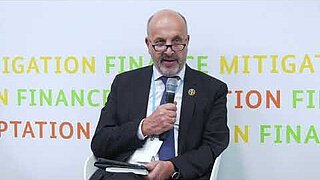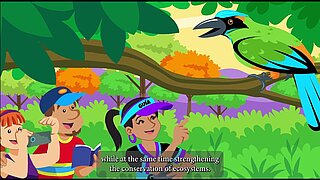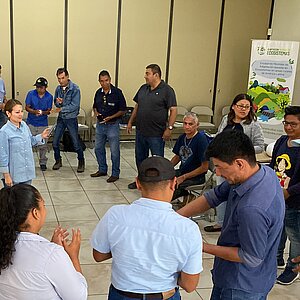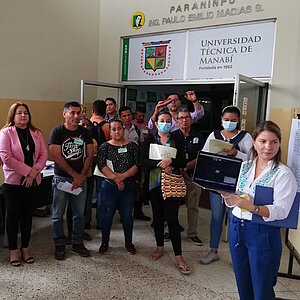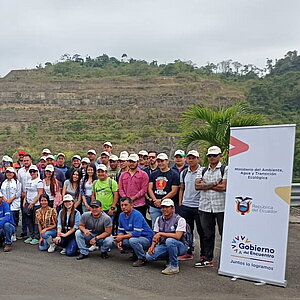Gender justice and ecosystem-based adaptation
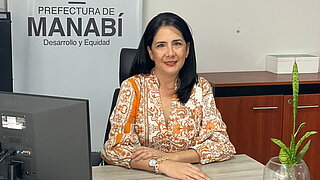
Interview with Cielo Mendoza, Director of International Cooperation, Investment and Financing at the Manabí Provincial Government in Ecuador.
Climate change mitigation and biodiversity conservation projects are more successful, sustainable and equitable when specific gender justice measures are embedded in the goals and implementation. At the IKI Brown Bag Lunch in October 2022, three women shared experiences on this from their daily work. One of them was Cielo Mendoza. She empowers women to contribute to more resilient communities, in part through ecosystem-based adaptation measures.
How does your work contribute to combating climate change?
In the Department for International Cooperation, we seek out partnerships and external projects that can be reproduced or implemented in Manabí. We work together with the whole prefecture. One example of this is the work we are engaged in the northern part of the province, where a group of 100 women are being trained as promoters for community-led epidemiological monitoring. While the focus here is more on health, there are also modules dealing with avoiding environmental disasters as well as community healthcare. Working with other departments has also given us a wealth of related experience when it comes to investigating opportunities for growth and the acquisition of technologies.
Do you and your unit work on adaptation to ecosystems with the IKI project?
Yes, this is one of the initiatives that we are implementing in various regions together with the Environment Department. While there are still these differences between women and men, the ecosystem-based activities have let us identify active participation on the part of women that would not be possible without the IKI.
What influence do gender and the various gender roles have in the context of ecosystem-based adaptation?
We need to break down gender stereotypes and seek out an equilibrium with the ecosystem that is suffering due to this imbalance, which results from a lack of access of women to decision-making processes. Without this harmonious balance, words about rights or respecting nature remain just words – essentially worthless. The IKI initiative aims to ensure that the participation of women in decision-making is both valued and accounted for within the community.
Do you encounter structural challenges during your work – such as to do with legislation, for example – in your efforts to achieve gender justice?
The head of the Prefecture Government, Leonardo Orlando, has really tried to ensure a balanced relationship between the genders in many different areas. This is also reflected in the design of projects and public measures, although ensuring rights are actually upheld is important – and particularly in the context of gender-specific violence. A series of pioneering public measures is being drawn up and has been adopted in the province for countering gender-specific violence. One example of this is a project from the Department for Social Development, which has set up 14 comprehensive counselling centres across the entire province for women who have been victims of violence.
In your opinion, what contribution is made by women, girls and members of the LGBTIQ community within the ecosystem-based adaptation project?
From experience, we know that all groups have been able to participate. One example is the ‘Teaching values’ project, which is a sports school that is promoting values and active participation in community life and society itself. Values learned here ‘cascade down’ into the families and community organisations, where they create fertile ground for a positive future.
And how do men contribute, in your opinion? Are there differences or stereotypes?
There is something of a movement towards integrative participation, with the result that men recognise the value of women in many different areas. So I would say that their biggest contribution is actually recognising participation by women.
In your opinion, how can we support women and members of the LGBTIQ community so as to promote gender justice and gender equality in IKI projects and in collective work in general?
I think the most important thing here is to recognise the LGBTIQ community as individuals who can change society and who have equal legal personhood. This drives a change in social behaviour patterns. Without this recognition, egalitarian and fair participation becomes difficult. Accordingly, it’s important to promote and support structural and innovative changes, while taking into account the needs of the entire community.
Could you also give us an example of a proven approach to achieving the successful integration of women, girls and other disadvantaged groups – such as members of the LGBTIQ community – into these projects?
The projects that are being implemented in Manabí are inclusive, because they were developed from the starting point of a vision of integration together with the ecosystem-based adaptation projects from the IKI as well as from other development aid workers. The best example of this is the approach taken by the provincial government in all of their measures and projects.
And are you already seeing a significant level of participation – by women, for example – in these projects?
Yes, definitely. Today, we have a ratio of 50:50 or 60:40 and, depending on the type of measure in question, many of the organisations are managed exclusively by women. In the northern part of the province, for example, there is an association of female coffee producers. They play a leading role in their community and, unlike in other organisations, where men usually take on the decision-making roles, this association has also introduced additional measures.
[The interview was conducted by Karen Kleinwort, Project Manager of the International Climate Initiative at Zukunft-Umwelt-Gesellschaft gGmbh.]
The link has been copied to the clipboard
Contact
IKI Office
Zukunft – Umwelt – Gesellschaft (ZUG) gGmbH
Stresemannstraße 69-71
10963 Berlin
Our interview partner
Cielo Mendoza works as Director of International Cooperation, Investment and Financing at the provincial government of Manabí in Ecuador. Manabí is one of the implementing regions of the IKI project Scaling-up of Ecosystem-based Adaptation Measures in Rural Areas in Latin America.




